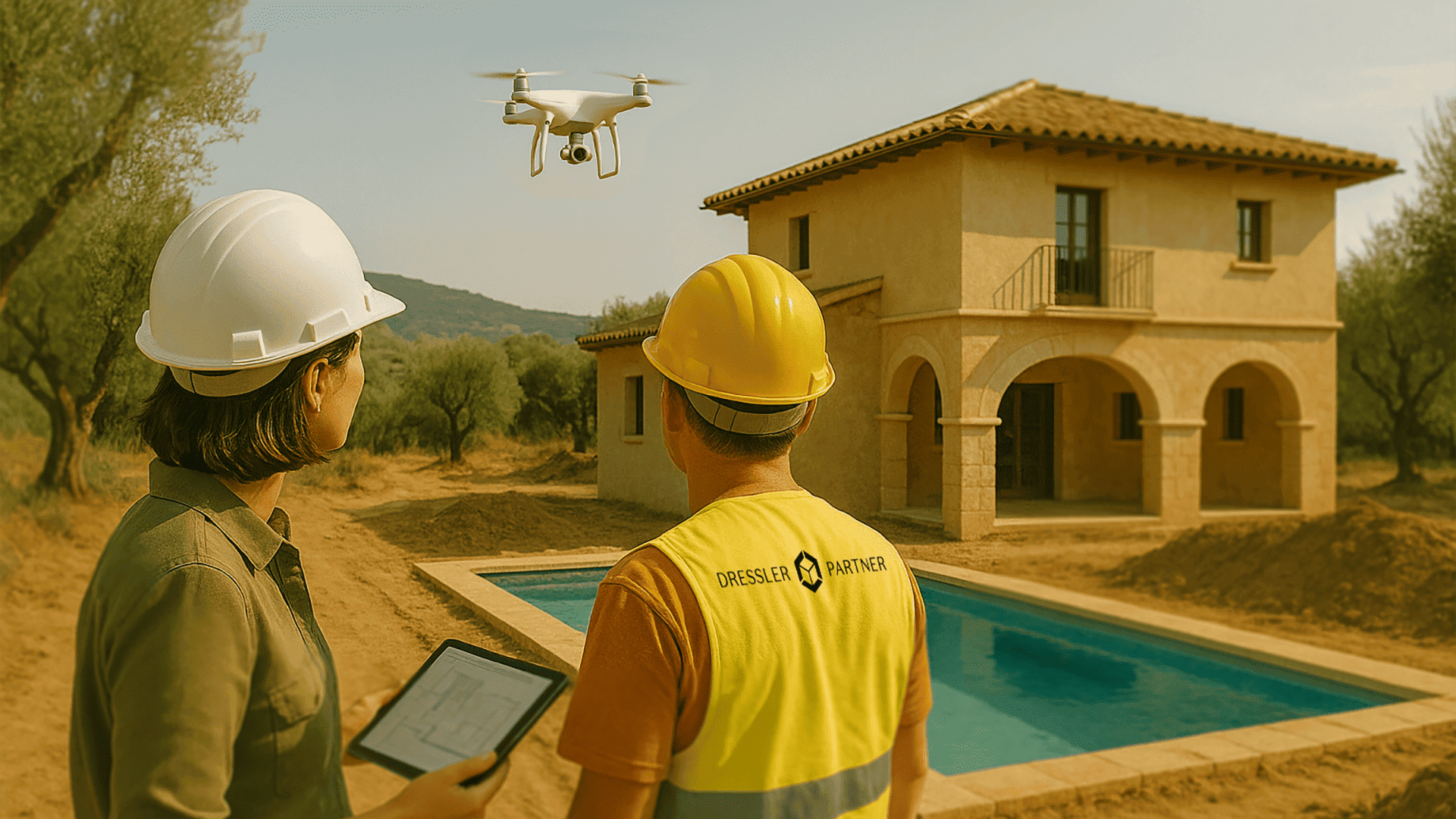

What official authorisations are required for a new build in Majorca?
To build a house in Majorca, numerous official authorisations must be obtained and administrative hurdles overcome. The following is a step-by-step explanation of the permits and requirements needed for the entire construction process, from the selection of the plot to the final inspection of a new build on the Balearic island.
Land purchase and initial checks
- Ownership and register check
- Buildability of the plot (Clasificación del Suelo)
Before buying a plot of land, you should first check whether the seller is actually the legal owner of the property. This is done by checking the land register (Registro de la Propiedad). It must be ensured that the property is free of debts, liens or mortgages that could hinder the construction process.
Not every plot of land in Majorca can be built on. Building land is divided into different categories:
- Urbano: Already developed building land on which building is permitted
- Urbanisable: Land that may be released for development in the future but is not yet developed
- Rústico: Agricultural or semi-natural land on which very strict building regulations apply and new buildings are severely restricted
An architect should carry out these checks before purchasing the land to ensure that the planned building project is possible.
Building licence (Licencia de Obra Mayor)
- Submission of the building project
- Architectural plans of the new building
- Technical specifications
- Calculation of the construction costs
- Environmental report, if required
- Confirmation of compliance with the development plan of the respective municipality (Plan General de Ordenación Urbana, PGOU)
- Review by the municipality
- Granting of the Licencia de Obra Mayor
- Start of construction and additional authorisations
- Notification of the start of construction (Comunicación Previa de Inicio de Obras)
- Disposal of excavated material and waste
As soon as the plot has been secured, a detailed building application must be submitted to the relevant local authority (Ayuntamiento). A licensed architect (Arquitecto Colegiado) draws up an architectural project that takes into account all technical and building regulations.
The documents submitted include
The municipality reviews the project in various stages. This includes checking compliance with building regulations, aesthetic requirements and environmental compatibility. Depending on the complexity of the construction project, this review can take several months.
If the project fulfils all the requirements, the building permit (Licencia de Obra Mayor) is issued. Construction may not begin without this authorisation. This authorisation is valid for two or three years during which the construction must be completed. You can submit 2 further building extensions, which are also limited in time.
Before the actual start of construction, the developer must inform the municipality of the exact start date. During this phase, additional requirements such as noise protection measures or traffic regulations for the construction work can be specified. The notification of the start of construction must be made no later than 6 months after the licence has been issued.
Majorca attaches great importance to the proper disposal of construction waste. A licence for the disposal of excavated materials (Licencia de Gestión de Residuos) must therefore also be obtained during the licensing phase. It must be ensured that waste is disposed of or recycled in an environmentally friendly manner.
Water, electricity and sewage connections
- Connections to the infrastructure
- Authorisation for septic tanks or sewer connections
Water and electricity connections must be organised during the construction phase. Separate licences often have to be applied for from the utility companies. These connections are usually temporary and intended for the construction site. Further applications are necessary for the permanent connection after completion of the house.
In rural areas where there is no access to the public sewage network, a private septic tank (Fosa Séptica) must be applied for during the authorisation phase. In urban areas, the connection is made to the public sewage system, for which authorisation are also required.
Construction supervision and compliance with standards
- Construction site supervision
- Health and safety regulations
During the construction process, the architect or site manager must ensure that the construction work is carried out in accordance with the approved plans and standards. Regular inspections are carried out to check compliance with the building regulations.
The construction company is obliged to comply with the applicable health and safety regulations on the construction site. This also includes the obligation to appoint a safety coordinator (Coordinador de Seguridad y Salud) for the construction site to monitor compliance with the regulations.
Final approval and completion of the construction project
- Final approval of the construction (Certificado Final de Obra)
- Certificate of Habitability (Cédula de Habitabilidad)
- Registration in the land register
- Final authorisation for electricity and water connection
Once the construction project has been completed, the architect must carry out a final inspection and issue a final building inspection certificate (Certificado Final de Obra). This report confirms that the building has been constructed in accordance with the approved plans and fulfils all legal requirements.
The so-called Cedula is no longer required and is now included in the building approval licence of the municipality.
Once the construction work has been completed, the new building must be registered in the land register. This is a requirement for the subsequent sale or mortgage of the house. The house should also be registered with the local land registry authority to ensure the correct calculation of property tax (Impuesto sobre Bienes Inmuebles, IBI).
Finally, final authorisations for the permanent electricity and water supply must be obtained. These connections can only be activated once the certificate of habitability has been issued.
Conclusion
Building a house in Majorca is a complex process that requires close collaboration with architects and the local municipality. The most important steps include:
- Checking land ownership and buildability
- Obtaining the building licence (Licencia de Obra Mayor)
- Compliance with the requirements during the construction phase
- Applying for the final inspection and the certificate of habitability
The whole process can take years and requires detailed planning and an understanding of Spanish building regulations and processes. Early and comprehensive advice from professionals is essential to avoid costly mistakes and ensure a successful construction project.

